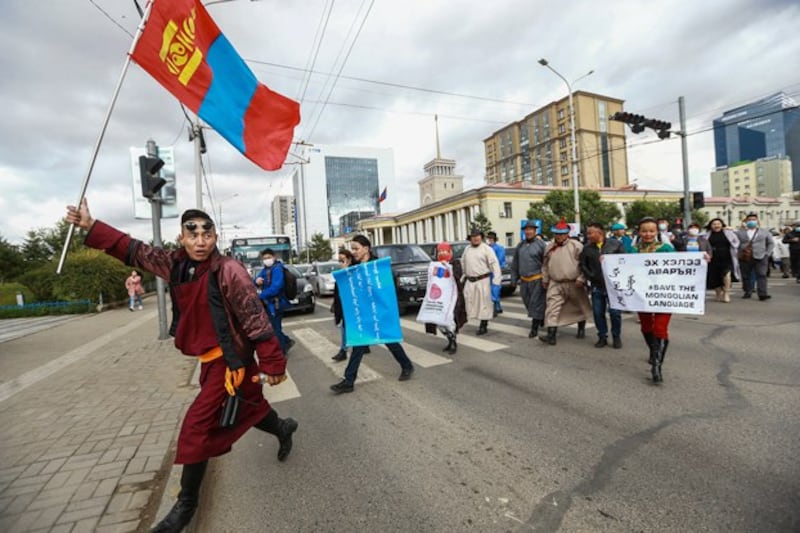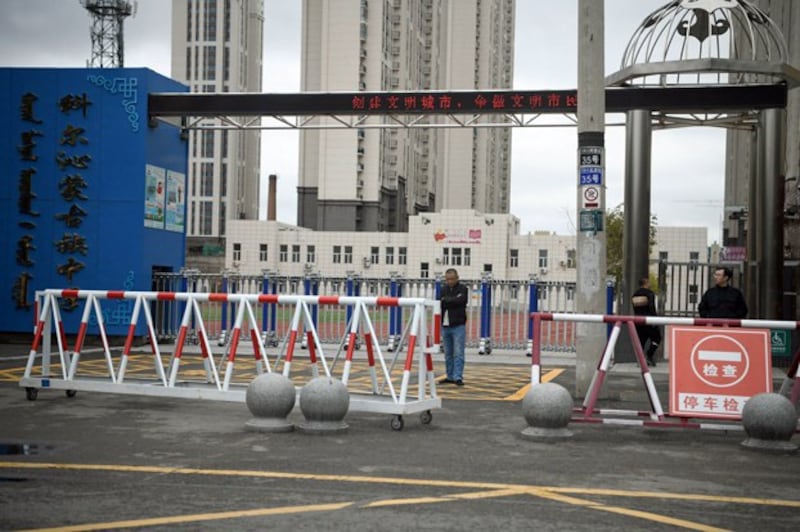Chinese authorities in the northern region of Inner Mongolia have cut the number of weekly Mongolian language classes from schools across the region, Radio Free Asia has learned.
The move comes as schools complete the phasing out of Mongolian in favor of Mandarin as a medium of instruction for non-language classes including history, math and science — a policy that sparked mass protests by parents and students followed by a regionwide crackdown when it was first announced in September 2020.
Mongolian language classes have also now been banned from kindergarten, and reduced from seven timetabled classes a week to just three, according to people familiar with the matter.
Following on from the policy announced in 2020, the education bureau in the regional capital, Hohhot earlier this year ordered primary and secondary schools across the city to ensure they are using only Mandarin as the language of instruction from the start of the academic year on Sept. 1.
A school teacher in Inner Mongolia's Ordos city who gave the single name Uyunqimg told RFA that Mongolian language classes have also been cut in many schools, and that the Mongolian language test will be removed from college entrance exams in the region.
"Mongolian language teaching hasn't all been canceled, but that may happen gradually," she said. "The ultimate goal is definitely canceling all of it, because the Mongolian-lanauge test is being removed from the college entrance exam."

An ethnic Mongolian living in the region who is familiar with the matter but asked not to be named for fear of reprisal, confirmed that high school entrance exams will use Chinese only from 2025, while Mongolian will disappear from the college entrance exam by 2028.
"The trend in the future will be for the Mongolian language to gradually disappear from textbooks," the person said. "However, there are still Mongolian language departments in Chinese colleges and universities, so it's hard to say what will happen in future."
Uyunqimg said some kindergartens have also stopped teaching students Mongolian children's songs, replacing them with songs in Chinese.
"As far as I know, kindergartens now no longer teach Mongolian children’s songs, and teach children Chinese songs instead," she said. "This is true in some places, but not necessarily in all places."
"In some places, Mongolian language teachers have to teach other classes because there are obviously fewer Mongolian language classes,” Uyunqimg said.
Region is losing autonomy
The New York-based Southern Mongolia Human Rights and Information Center has also reported that the Chinese authorities are enforcing a total ban on the Mongolian language in all schools across Inner Mongolia.
"All Mongolian schools — including kindergartens — are now required to use Chinese exclusively as the medium of instruction for all subjects," the group said in a Sept. 1 report on its website.
It quoted an ethnic Mongolian parent as saying in a WeChat discussion group that Beijing is "spreading misinformation and brainwashing the Mongolians."
"Our autonomous region has lost autonomy entirely,” another said, while another said homeschooling wasn't an option either.
"Refusing to send your children to school is not allowed," they commented on the discussion.
“This is not just a denial of our right to our mother tongue," said another WeChat comment. "This is a threat to the survival of our Mongolian nation and people.”

The report said the move was a facet of "cultural genocide" by the ruling Chinese Communist Party.
Yang Haiying, a professor at Shizuoka University in Japan, said the moves are all in line with the "cancellation" of the bilingual culture that once existed in the region's schools.
"They are starting to implement Mandarin-medium teaching in line with the cancellation of the bilingual policy that was released in June 2020," Yang said.
"There are very few Mongolian language classes now, and they just teach them how to write their own name and say greetings and so on."
Exam points handicap
The Inner Mongolia Admissions and Examination authorities will also slash examination points handicaps for ethnic Mongolians, Daur, Oroqen, Evenk and Russians from 10 points to five with effect from 2026, according to the region's official examinations and admissions website.
Yang said the move will widen inequality between ethnic minority students and majority Han Chinese, who get much bigger handicaps if they take the test in ethnic minority areas.
"If you're Han Chinese and take the exam in the [Inner Mongolia] autonomous region, in Mongolian, you can get a handicap of 100 points," he said.
Germany-based ethnic Mongolian activist Xi Haiming said the authorities are also using other methods to force ethnic Mongolian children to abandon their native language in favor of Chinese, often by putting pressure on parents at their place of work.
"Parents who send their kids to a school that teaches Mongolian can get fired, which is a lot of pressure," Xi said.
"This coercive insistence on Chinese-medium teaching imposed on Mongolians by the authorities is really inhumane."
Translated with additional reporting by Luisetta Mudie .
